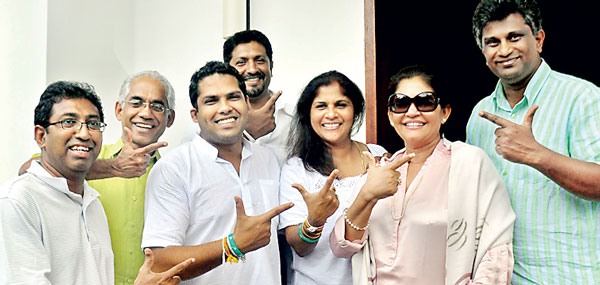[[Harin Jubilant]
The UPFA barely hung on in Uva. Grimly winning a narrow victory, that saw a significant dent in voter support for the ruling Rajapakse Administration. The UPFA Uva campaign was led by a presidential nephew, incumbent chief minister Shasendra Rajapakse being the son of Speaker Chamal Rajapakse. The decline in voter support was quite marked. Compared to the 2010 general elections, the UPFA saw its support in Badulla District decline from 58% of the popular vote to 47% and in the more Sinhala majority Monaragala District where it fared better, the UPFA still declined from a stratospheric 75% in the 2010 general elections to a more modest 58%. The UNP experienced a resurgence under very trying circumstances to bring about a near photo finish in Badulla with 45% of the popular vote and increased in vote share in Monaragala District from a dismal 18% at the last general elections to a more respectable 32%. The UNP also managed to secure a majority in several constituencies in the Badulla District, the first time in many elections that it has been able to do so.
The credit for the UNP resurgence needs to go firstly to its young Chief Ministerial Candidate former MP Harin Fernando, who had the political courage and foresight to resign a parliamentary seat, shortly before a likely general election and run in a campaign of a giant amongst midgets. He holds himself in good stead for the forthcoming general elections and his stock within the UNP is also at a new level. He broke all Sri Lankan electoral records securing 88% of the UNP’s preference votes in the Badulla District and securing an amazing 173,993 preference votes. By contrast the UPFA’s incumbent chief minister secured a 96,619 votes or 69% of the UPFA vote in the Monaragala District. The JVP basically maintained its 4.5% and 6% vote it secured in the 2010 general elections as the DNA and the Democratic Party failed to make any impression demonstrating that its strength is patchy or in pockets of an urban middle class.
A common program first and not a common candidate
The UNP’s performance was quite remarkable and a start on which they can build if they put in a lot of hard work to create a broad opposition front. The PC results may not necessarily hold for a presidential election, if the candidate fails to capture the imagination. Young Harin resigning from parliament and leading an energetic campaign against a tired UPFA would not be identical to a presidential election narrative.
For a presidential election victory, the UNP must focus more on a common opposition policy platform or minimum common program for the presidential elections rather than the candidate. By swinging the opposition discourse to the candidate and seeking to get opposition support for a Ranil Wickramasinghe candidacy, the UNP is getting the cart before the horse and driving away the other opposition forces of the JVP, the Democratic Party, the ethnic minorities and civil society groups such as trade unions and professional bodies which would all need to come together to mount a serious challenge to the Rajapakse regime at the next presidential elections, likely in early 2015.
A power play loss for the Rajapakse Regime
The Rajapakse Administration besides its core support base, draws quite heavily on a power play of state patronage and coercion to win elections. Accordingly the election campaign witnessed the widespread use, or rather abuse of Samurdhi officials, government vehicles, state media, drought relief, police partiality and election commission impotency in the election campaign. The Sri Lankan State or the system is so fragile (though not failed) it does not provide any check and balance on this abuse, such as the Supreme Court deciding that the government could provide drought relief in the Monaragala District during the campaign, though it did not do so anywhere else in the country.
But this acquiesce by the state is driven and maintained largely by the fact, that the morning after the election, the government will still be standing and that public support holds with the government. Where public support is weak for the government the system does provide some corrective measures. Such as during the Northern Provincial Council elections, the elections commission acted much better to check abuses, it was only Governor Chandrasiri’ s unprecedented and ultimately fruitless campaigning for the government that it was unable to stop. If popular support continues to slip away from the Government, its ability to abuse the process declines, though the prospect for violent campaigning increases but more importantly the floating voter is less coerced since the threat of the loss of patronage becomes less credible. This is a factor that the Regime would be well aware of. It cannot take the security forces for granted either since the previous Southern and Western Provincial Council elections showed that the postal voters of the security forces were going quite a bit towards General Fonseka ‘s Democrats.
The UPFA’s general response is to blame the second string of provincial candidates it featured at the elections for their poor showing and draw solace from the fact that when they field their champion at the presidential election, that Mahinda Rajapakse is the most powerful weapon they have. Undoubtedly so, but as Uva demonstrated the potency of the weapon and the attraction of the brand is declining and the question is by early next year, nationally by how much?
– Courtesy GroundViews
